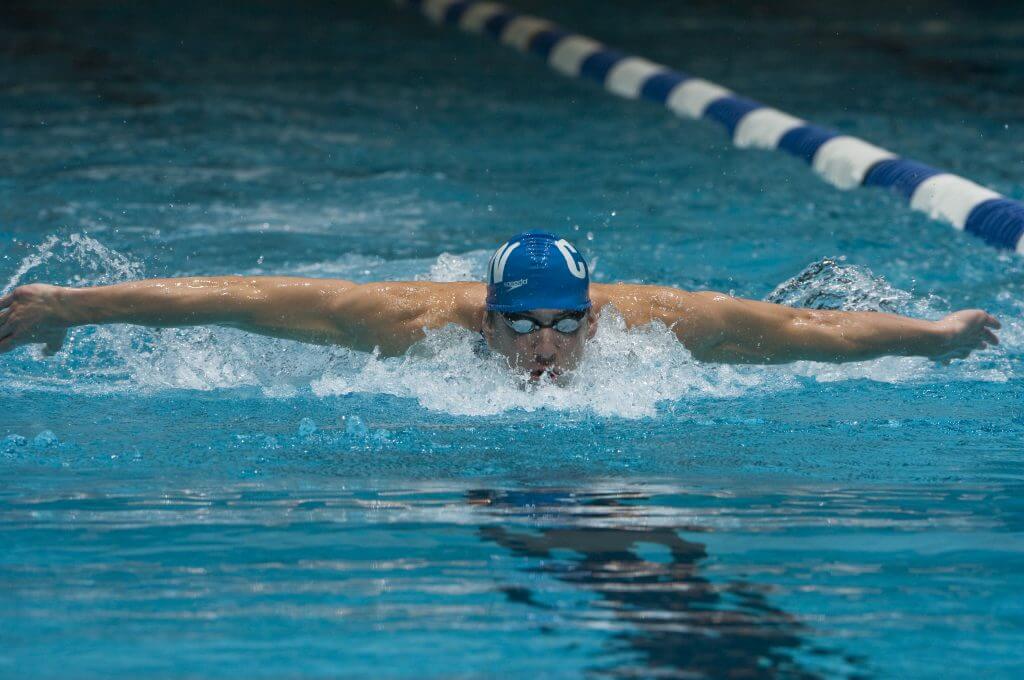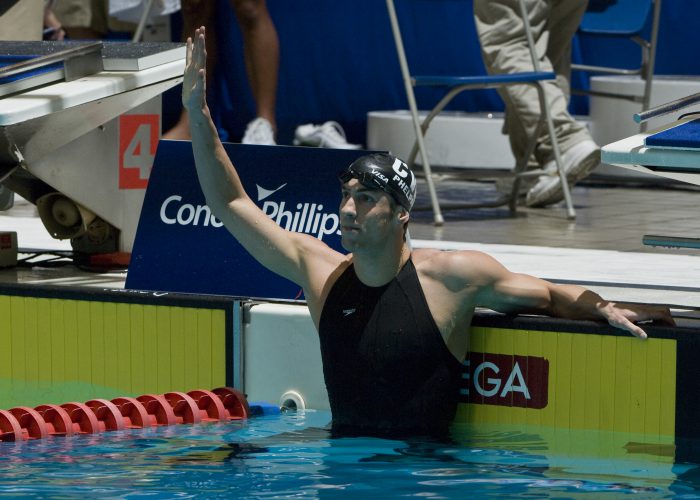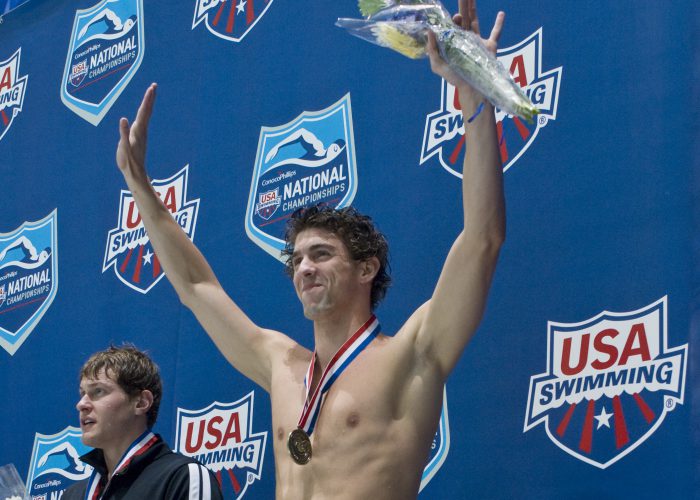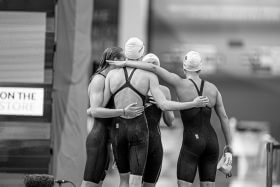ZUMO Performance of the Week: 13th Anniversary of Michael Phelps’ 400 IM to Cap Off 2007 World Championships


Since there won’t be any swim meets for the next couple of months, we will honor past performances for the ZUMO Performance of the Week. 13 years ago on April 1, 2007, Michael Phelps of the United States capped off an incredible week at the World Championships in Melbourne with a 4:06.22 in the 400 IM, breaking his own world record by two seconds.
It was an amazing swim by the 21-year-old Phelps, who used the 2007 Worlds as a dress rehearsal for his historic and iconic run a year later at the 2008 Games. To make it even more impressive, he swam two seconds faster than his previous best, on day eight of a long program at the World Championships.
From the archive via John Lohn:

Michael Phelps in 2007. Photo Courtesy: Peter H. Bick
ALL week, Michael Phelps has been extraordinary, packaging one of the finest performances the sport has seen. Tonight, he walked away from his last race in appropriate fashion: With a world record. Pulling away from American teammate Ryan Lochte in the breaststroke leg, Phelps powered through the freestyle leg and blew away his former global standard.
Phelps touched the wall in an eye-popping 4:06.22, more than two seconds under the 4:08.26 he used to win gold at the 2004 Olympic Games in Athens. Phelps actually trailed Lochte by .03 after the backstroke, but opened up a one-plus second lead in the breaststroke and continued to pour it on down the stretch. The win complemented his earlier individual triumphs in the 200 freestyle, 100 and 200 butterfly events and the 200 I.M. He’s broken five world records. He was also a member of the triumphant 400 and 800 free relays.
“I wanted to have a strong breaststroke,” Phelps said. “That’s probably my most improved leg in the last six months to a year. (Underwater power) is definitely something that is a strength and I wanted to nail that last wall and give it all I got. It was my last race, so I wanted to finish strong.”
Phelps was supposed to have a chance at eight gold medals, but a disqualification by the United States in the morning preliminaries of the 400 medley denied that opportunity. The DQ prevented Phelps from becoming the first man to win eight medals in a World Champs and the first to win eight gold medals in a major international competition. But, Phelps showed a ton of team pride in his support of Ian Crocker, the man whose early takeoff led to the disqualification.
“When Team USA comes into a meet, we come as a team and we exit as a team,” he said. “There are things that don’t always happen the way you want, but better now than next year (at the Olympics). We’re disappointed, but we’ll build off it.”
Lochte earned the silver medal, his third of the competition, by touching in a career-best mark of 4:09.74, quick enough to defeat Italy’s Luca Marin, the bronze medalist in 4:09.88. Tunisia’s Ous Mellouli, the bronze medalist at the last two World Champs, was fourth in 4:11.68 and defending champ Laszlo Cseh (Hungary) was fifth in 4:14.76.
Although it happened 13 years ago, congratulations to Michael Phelps on winning the ZUMO Performance of the Week!
From the archive via Craig Lord:

Michael Phelps in 2007. Photo Courtesy: Peter H. Bick
Michael is in full flow at the mike, hunched forward and flanked by his coach Bob Bowman on one side, US head coach Mark Schubert to the other. Suddenly Phelps interrupts himself and the media. His attention is gone, lost in the world he revels in.
On the monitor at the back of a press conference room in which just 14 journalists sat to listen to the greatest performer in the pool of all time – contrast that with the gathering of 250-plus peering in on the troubled world of Ian Thorpe – former Baltimore training partner and US teammate Katie Hoff is on her way to making history, as he had just done himself, over 400m medley.
Phelps’s eyes widen, he turns to raise an eyebrow in the direction of Bowman, who smiles back like a father watching the unfolding of a smile on the face of a child thrilled by the wonder of his world. “There she goes, it’s gonna be a world record,” says Phelps. Hoff stops the clock at 4:32.89. Deal done. Yana Klochkova and 4:33.59 a part of the past.
When Phelps and Bowman leave the room, Schubert notes with a smile: “He knew exactly with a 100 to go that she was inside world record …”. Mind on the matter, hearts beating as one.
Was this key to the phenomenal performance of Team USA? Schubert gave a slightly American reply: “Coming in here we knew that the last time the United States had really lost a major international competition was here in Melbourne in 1956.” No mention of Fukuoka 2001, Talbot and the gold count that counts the most, one that placed Australia ahead.
Still, the point was made: it wasn’t going to happen again here in Melbourne. “All the athletes really feel a strong part of that tradition,” said Schubert. “What I’m always impressed with is how they help each other from the time they came together on the training camp at Geelong. We saw things like Brendan Hansen giving Tara Kirk breaststroke lessons, sharing his knowledge, and we’ve seen that kind of support across the board.”
It explained very much indeed about the value of moving in numbers: “We have tremendous chemistry from kids all over the country who just want to see each other succeed. It’s very gratifying. It’s one of the best team performances we’ve ever seen.”
How important was the spirit of helping? “The spirit of helping is all the difference, ” said Schubert. “They really feel part of each others’ success. They are so supportive if someone is disappointed … they pick each other up.”
The critical moment, the watershed, the turning point was Phelps’ drubbing of Thorpe’s 200m free world record, he believed: “Once we got the ball rolling, particularly with Michael’s swim over 200m free: that’s what really lit the fire.”
Why, Schubert asked, was the rest of the world simply unable to keep up? “You know, I have so much to think about making sure we’re good, I don’t think about that,” he dodged with a smile before explaining the positives of US swimming: “We have a tremendous advantage because of the number of people who swim and are involved in swimming.”
Then the words that can only serve to demoralize those on a distant shore still further: “We’ve felt for a number of years that we’re underachieving compared to the population we have in swimming. Right now we’re trying to focus on utilizing our talent. Developing talent like Phelps and Coughlin really helps that, and helps us to continue our tradition.
“I truly feel we can get better from here.”
The low point in US swimming, he thought, had been 1988 after the boycott years had left a gap in the flow of inspiration. The 1976 Olympic men’s team that won every title barring the 200m breaststroke that went to Britain’s David Wilkie, unfolded because “we had the inspiration of Spitz four years before”.
Learning from mistakes has become part of the genetic make-up of Team USA. Take the Crocker mistake in the relay. “You know, it’s sports,” said Schubert. “They’re still young adults and they are all trying their best and we made a mistake and we are sure not going to blame our guys, and we are going to learn from it and we’re going to move forward and do a lot better a year from now.”
Yes, it deprived Phelps of a sure eighth gold medal (sure, because the US heats time was faster than the winning Australian effort in the final) but the moment would be lost in time, Schubert predicted. He recalled Bruce Furniss at the 1975 worlds, when in the 800m freestyle relay “he jumped by a mile”. A year later Furniss won the Olympic 200m free crown in Montreal and the US team took gold in the 800m free relay, breaking the world record twice in the process. Then “everybody forgot about it (1975) … that’s what it’s going to be like with this,” said Schubert.
Did Phelps now rate alongside Mark Spitz? “Mark Spitz’s performance was tremendous and has inspired the US for many years, and that is kind of been the benchmark but if you look at Michael’s performance from the standpoint of all four strokes, his relay split leading off the 400 free relay, where that would have ranked him in the 100 free, and continue through the 400 IM and the 200 ‘fly, and know if he had swim the 400 free that would have been an interesting phenomenon…”
“There has been nobody that’s been not just as dominant but as versatile. His performance this week was the greatest performance of all-time,” said Schubert.
And it included five individual golds. “I don’t really look at it by medals but by the dominance and by the records and the way he handled it from ever to event to event,” said Schubert. “I just didn’t notice any weak points … and then (in the 100 ‘fly) when he goes to touch the wall and his head is clearly behind but he still finds a way to get his hands on the wall.
“He can do it from behind, he can do it from the front, he can do it when it’s close, he can do it when it’s not close.”
Which was the best of all his efforts? “It’s very difficult to say but when you shatter the world record in the 200 ‘fly like he did and beat the field by 3sec in a world championship, that’s mind-boggling.”
Phelps not only inspires his team in competition, Schubert revealed. “I communicate a lot with Bob, just to kind of help me with benchmarks to inspire other coaches and swimmers and he just tells me about some of the things Michael does in training which are phenomenal. Also the way he competes in-season and out of season.”
He cites efforts in California and the world 200m ‘fly record set at Missouri a month out from Melbourne. “There’s no doubt that when you break a world record a month out when still in hard training, that it was pretty obvious we would see something special.
“We didn’t know it would be this special.”
Had America been graced with the birth of another Phelps? “He’s got to be out there. We are going to find him,” said Schubert. There may be some wait but only a fool would doubt the course of history.

Previous ZUMO Performances of the Week


ZUMO Performance of the Week: Adam Peaty Swims 58.1 100 Breast With Ease





Brayden Franzke